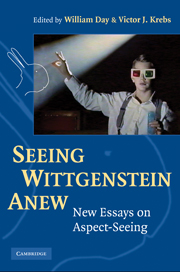Book contents
- Frontmatter
- Contents
- List of Contributors
- Acknowledgments
- Abbreviations of Wittgenstein's Works
- Seeing Wittgenstein Anew
- Introduction: Seeing Aspects in Wittgenstein
- I ASPECTS OF “SEEING-AS”
- II ASPECTS AND THE SELF
- III ASPECTS AND LANGUAGE
- IV ASPECTS AND METHOD
- IV.1 Therapy
- IV.2 Seeing Connections
- 14 Overviews
- 15 On Being Surprised
- 16 The Enormous Danger
- Appendix: A Page Concordance for Unnumbered Remarks in Philosophical Investigations
- List of Works Cited
- Index
15 - On Being Surprised
Wittgenstein on Aspect-Perception, Logic, and Mathematics
Published online by Cambridge University Press: 05 June 2012
- Frontmatter
- Contents
- List of Contributors
- Acknowledgments
- Abbreviations of Wittgenstein's Works
- Seeing Wittgenstein Anew
- Introduction: Seeing Aspects in Wittgenstein
- I ASPECTS OF “SEEING-AS”
- II ASPECTS AND THE SELF
- III ASPECTS AND LANGUAGE
- IV ASPECTS AND METHOD
- IV.1 Therapy
- IV.2 Seeing Connections
- 14 Overviews
- 15 On Being Surprised
- 16 The Enormous Danger
- Appendix: A Page Concordance for Unnumbered Remarks in Philosophical Investigations
- List of Works Cited
- Index
Summary
Wittgenstein's remarks invoking aspect-perception mirror his overall development as a philosopher. While I do not want overly to geneticize the philosophical terrain connected with aspect-perception, I do think it worth emphasizing that the duck-rabbit of the Philosophical Investigations is only one kind of example of aspect-perception, and that some of the most vivid, natural, and compelling uses of the idea of seeing aspects, interpreting one system in another, or being struck by a new aspect of a diagram, word, or sentence – as well as the earliest, most frequent, and systematic appearances of these themes in his philosophy – occur in Wittgenstein's discussions of mathematics and logic.
After a few remarks about the constructive nature of Wittgenstein's preoccupation with pictures (Section 1), I consider the earliest passage in his writing invoking puzzle-pictures (Section 2), then consider PI §§523–25 in relation to his earliest thoughts (Section 3), and finally look at how his uses of aspect-perception bridge the evolution in his thought from earlier to later (Section 4).
In his writings on logic and mathematics, Wittgenstein points recurrently toward cases of seeing aspects anew, not to maintain that mathematical objectivity is based upon intuition in anything like Kant's sense, but instead to transform Kantian ideas about how mathematics and logic structure our forms of perception and understanding. Like Kant, Wittgenstein hoped to reorient the notion of “discovery” as it plays a role in discussions of logic, mathematics, and philosophy, critiquing the idea that the mathematician or philosopher uncovers surprising novel facts and objects.
- Type
- Chapter
- Information
- Seeing Wittgenstein Anew , pp. 314 - 337Publisher: Cambridge University PressPrint publication year: 2010
- 20
- Cited by



